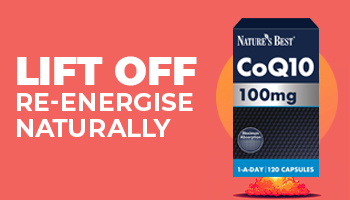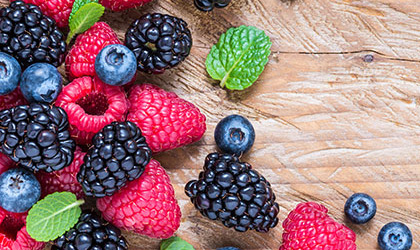
Found in every cell of the human body, CoQ10 operates as a powerful antioxidant and plays an important role in cellular energy generation. As we age, our natural CoQ10 levels decrease, as does our ability to convert CoQ10 into its active form, ubiquinol.
Since conception demands such a huge amount of energy, CoQ10 appears uniquely equipped to support fertility. As such, there has been an extensive amount of research into whether a dietary supplement of CoQ10 may support sperm and egg quality and other aspects of fertility. And the findings are very promising, as we explore in the article below.
Explore our CoQ10 range here.
What does CoQ10 do for fertility?
CoQ10 supports fertility and sperm and egg quality in two main ways. Firstly, CoQ10 is an important component of the electron transport chain, which helps generate energy in our cells. When CoQ10 levels are greater, the electron train produces more energy. And with more energy, cells operate at a higher level, positively affecting sperm and egg maturation.
 Secondly, CoQ10 serves as a potent antioxidant. This quality helps protect cells against the harmful effects of nefarious free radicals, which conspire to hijack our fertility and overall reproductive system.
Secondly, CoQ10 serves as a potent antioxidant. This quality helps protect cells against the harmful effects of nefarious free radicals, which conspire to hijack our fertility and overall reproductive system.
It’s widely understood that fertility declines with age – and this is especially true in women for whom the decline is much more rapid. As we’ve already mentioned, CoQ10 levels also naturally decline with age. It’s no surprise, therefore, that CoQ10 supplementation has been found to improve sperm and egg quality as we age [1].
What CoQ10 should I take for fertility?
There are two forms of CoQ10: ubiquinone (the oxidised form) and ubiquinol (the active form). We have to convert ubiquinone into ubiquinol before it can be used, which the body finds increasingly challenging as we get older [2].
With superior bioavailability, ubiquinol is the most absorbable, body-ready, active form of CoQ10 – and that’s why it’s often recommended for specific health concerns, such as those concerning fertility.
Ubiquinol is also the only known fat-soluble antioxidant made naturally in the body, a quality that isn’t shared by the ubiquinone.
When choosing a ubiquinol supplement for fertility, it’s important to consider its absorption. CoQ10/Ubiquinol is a fat-soluble nutrient, so it needs to be suspended in oil to ensure the body absorbs it optimally. That’s why it’s worth choosing soft gel capsules that suspend CoQ10 in high-quality vegetable oil over powdered CoQ10.
Find out more about the difference between Ubiquinol and CoQ10 here.
How much CoQ10/ubiquinol should I take daily for fertility?
Most people generally attain between 3mg and 6mg of CoQ10 daily from dietary sources, such as red meat, oily fish, legumes, and some vegetables, like broccoli and spinach. However, experts recommend a daily intake of 100mg-600mg of CoQ10/ubiquinol for fertility [3].
Both sperm and eggs take around 90 days to mature. For optimal results, therefore, it’s advised to take CoQ10 and other fertility formulas for upwards of three months.
CoQ10 fertility success stories
The empirical data on CoQ10 supplementation for male and female fertility is hugely encouraging. In a 2015 study, researchers found low levels of CoQ10 may lead to age-associated declines in fertility [4]. However, the same study reported that supplementing with CoQ10 may help reverse age-related decline in egg quality and quantity, which is promising for women whose ovarian reserve declines with age.
It’s also worth noting that CoQ10 supplementation has been found to improve egg quality and quantity, as well as increase pregnancy rates, in younger women [5].
And the findings aren’t dissimilar for male fertility. As we already know, CoQ10/ubiquinol supports energy production in the mitochondria of our cells. To power the sperm cell to its destination, CoQ10/ubiquinol is vitally important since a large mid-section of the sperm cell comprises mitochondria.
In a 26-week double-blind placebo trial, researchers found ubiquinol led to healthy overall sperm [6]. The following results were published: 62% improved sperm count, 57% increase in mobile sperm and 52% improvement in normally shaped sperm.
Other studies have corroborated these findings; they consistently highlight that CoQ10 supplementation may improve sperm motility, concentration, sperm morphology, and progressive motility [7].
CoQ10 has earned a reputation for supporting fertility for good reason. To learn more about supplementing with CoQ10, have a free, confidential chat with one of our expert Nutrition Advisors here.
Explore our CoQ10 range here.
References:
-
Ben-Meir, A., Burstein, E., Borrego-Alvarez, A., Chong, J., Wong, E., Yavorska, T., Naranian, T., Chi, M., Wang, Y., Bentov, Y., Alexis, J., Meriano, J., Sung, H. K., Gasser, D. L., Moley, K. H., Hekimi, S., Casper, R. F., & Jurisicova, A. (2015). Coenzyme Q10 restores oocyte mitochondrial function and fertility during reproductive aging. Aging cell, 14(5), 887–895; Alahmar A. T. (2019). The impact of two doses of coenzyme Q10 on semen parameters and antioxidant status in men with idiopathic oligoasthenoteratozoospermia. Clinical and experimental reproductive medicine, 46(3), 112–118.
-
Mantle, D., & Dybring, A. (2020). Bioavailability of Coenzyme Q10: An Overview of the Absorption Process and Subsequent Metabolism. Antioxidants (Basel, Switzerland), 9(5), 386.
-
Xu, Y., Nisenblat, V., Lu, C., Li, R., Qiao, J., Zhen, X., & Wang, S. (2018). Pretreatment with coenzyme Q10 improves ovarian response and embryo quality in low-prognosis young women with decreased ovarian reserve: a randomized controlled trial. Reproductive biology and endocrinology : RB&E, 16(1), 29.
-
Ben-Meir, A., Burstein, E., Borrego-Alvarez, A., Chong, J., Wong, E., Yavorska, T., Naranian, T., Chi, M., Wang, Y., Bentov, Y., Alexis, J., Meriano, J., Sung, H. K., Gasser, D. L., Moley, K. H., Hekimi, S., Casper, R. F., & Jurisicova, A. (2015). Coenzyme Q10 restores oocyte mitochondrial function and fertility during reproductive aging. Aging cell, 14(5), 887–895.
-
Izadi, A., Ebrahimi, S., Shirzai, S., Taghizadeh, S., Parizad, M., Farzadi, L., & Pourghassem Gargari, B. (2018). Hormonal and Metabolic Effects of Coenzyme Q10 and/or Vitamin E in Patients with Polycystic Ovary Syndrome. The Journal Of Clinical Endocrinology & Metabolism.
-
AUA Journals. 2012. E?ects of the Reduced Form of Coenzyme Q10 (Ubiquinol) on Semen Parameters in Men with Idiopathic Infertility: a Double-Blind, Placebo Controlled, Randomized Study.
-
Alahmar A. T. (2019). The impact of two doses of coenzyme Q10 on semen parameters and antioxidant status in men with idiopathic oligoasthenoteratozoospermia. Clinical and experimental reproductive medicine, 46(3), 112–118.
You Might Also Like

Keri
Keri Filtness has worked in the Nutrition Industry for 19 years. She is regularly called upon for her professional comments on health and nutrition related news. Her opinions have been featured by BBC3, Prima, Vitality, The Mirror, Woman’s Own and Cycling Weekly, amongst others. She has also worked one to one with journalists, analysing their diets and health concerns and recommending changes and additions, where appropriate.
View More






